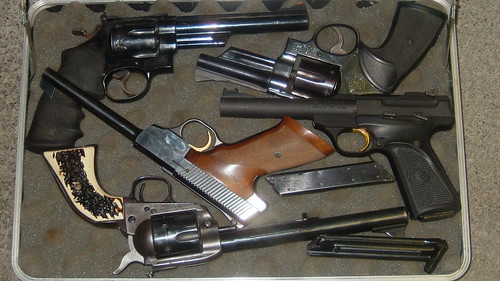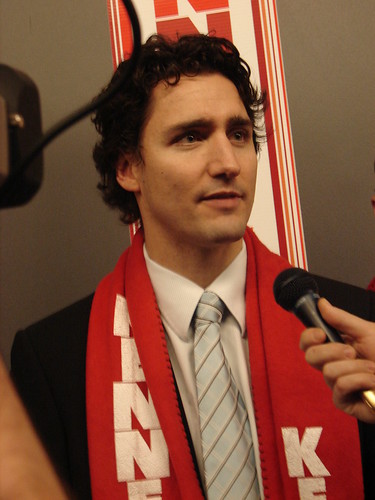RSS
Highlighting the need for a strike
 A strike against tuition hikes is possibly on its way.
A strike against tuition hikes is possibly on its way.
For those not in the know, the Mob Squad held a meeting yesterday in order to change that.
Both undergrads and graduate students were invited to the event. They were given a detailed presentation of the hike and what student can do to fight against it.
The CSU will hold a general assembly on March 7th. It will then decide whether to go on strike or not.
Montreal daycares remain closed
 Many Montreal daycares are closed today due to a rotating strike, CTV reports. The one-day strike is meant to protest the sluggish pace of negotiations between the union and the Ministry of Families.
Many Montreal daycares are closed today due to a rotating strike, CTV reports. The one-day strike is meant to protest the sluggish pace of negotiations between the union and the Ministry of Families.Vacation time and insurance premiums are key issues in the negotiations. The union is looking for six-weeks of paid vacation. The government is offering them five weeks after 25 years of service. The union is also trying to prevent employee insurance premiums from doubling up.
Quebec against gun registry vote
 The Partie Quebecois is protesting the expected passage of federal legislation to abolish the long gun registry. Leader Pauline Marois decided to start off the questions period in the national assembly in a different way. She read the names of the fourteen women gunned down at Montreal’s École Polytechnique in 1989.
The Partie Quebecois is protesting the expected passage of federal legislation to abolish the long gun registry. Leader Pauline Marois decided to start off the questions period in the national assembly in a different way. She read the names of the fourteen women gunned down at Montreal’s École Polytechnique in 1989.
Marois wants a clarification from the provincial government as to how they’ll better ensure gun control in the province.
Public Safety Minister Robert Dutil says the province will file a lawsuit the moment the bill receives royal assent. They want to stop Quebec’s registry data from being destroyed.
The federal legislation calls for the destruction of all records gathered since the registry was created by the former Liberal government.
ASFA CEO resigns unexpectedly before election polls open
 Just two hours before polls were set to open for the Arts and Science Federation of Associations general election, Chief Electoral Officer Chris Webster resigned.
Just two hours before polls were set to open for the Arts and Science Federation of Associations general election, Chief Electoral Officer Chris Webster resigned.
“It kind of surprises everyone, no one saw this coming,” said VP Internal Schubert Laforest.
According to Annex A, the bylaws that govern ASFA elections, the executive must take over an election in the circumstance that a CEO is absent. Laforest and President Alex Gordon immediately acted to set up the polling booths, but were one hour late to start.
Laforest said that Webster resigned due to “the atmosphere of the elections” and because of a Judicial Committee decision yesterday that accused the CEO of illegally allowing candidate Eric Moses Gashirabake to change his candidacy from VP Internal to VP Academic and Loyal Affairs. The JC ruled that Moses Gashirabake will be docked 65 votes off of his total for the infraction and will not receive reimbursement for one fifth of his campaign expenses.
Jeansil Bruyere, candidate for VP Academic and Loyola Affairs, filed the complaint. Now instead of running unopposed, Bruyere is running against Moses Gashirabake.
Laforest said that Webster did not agree with the decision, but was not at risk of losing his job over it.
“During the hiring process [Webster] seemed like the most capable and competent candidate their was and everyone on council who appointed him really had high hopes,” said Gordon.
This is the second ASFA CEO to resign this year. Marvin Cidamon resigned in October after being accused of violating Annex A during the fall by-election.
“I fear in the back of my mind that [candidates] might commit [violations] at this moment in time, but it wouldn’t be the CEO who would see it, it would be him who would deal with it after the fact,“ said Gordon. “If a contestation does come up it would go to the JC, so there are still bodies in place that could take measures if need be.”
ASFA general elections continue until Friday. Students can vote in the Hall or Library buildings and at Loyola campus.
If students see suspicious activity during polling, they are encouraged to contact the JC or the media.
This Week in Sports: February 15th

NHL:
The Habs have won four straight (not including Monday’s tilt against Carolina)… so what happens now? A run for the playoffs, or a run to 9th place, losing out on a high draft pick and setting the franchise back even further? The next week and a half will be telling as to where the Habs stand as a team currently, and as a franchise overall looking towards the future. For now, the city begins to hope for glory once more; let’s see if this streak was just another tease, or if this team is for real.
The Detroit Red Wings have tied the NHL record for most consecutive home wins in a single season, a remarkable achievement that could not have happened to a classier organization. The sporting world’s best example of consistent excellence, the Red Wings continue to entrench themselves as the best franchise in the National Hockey League; they may just add to that legacy by bringing home yet another championship this June if this torrid pace continues.
NBA:
Only one name comes to the forefront in this week’s NBA news: Jeremy Lin.
But perhaps one word describes it better: Lin-sanity.
The basketball world has been buzzing over the recent success of relatively unknown New York Knicks point-guard Jeremy Lin. Having been ushered out of Golden State and Houston without much fanfare, Lin found a spot within the Knicks franchise, and when he got his first career start last week, he took advantage and hasn’t looked back. Lin has put up the most points by any player in the history of the NBA in his first four starts, and in a story similar to Tebowmania when Tim Tebow was the darling of the NFL this past season, Lin has been able to generate a huge fan-base in a short period of time.
Now the question becomes whether or not Lin can continue to play at such a high level; will Lin-sanity survive?
(The Lin-sanity story was so big that it practically overshadowed the achievements of legends Kobe Bryant and Paul Pierce. Bryant became the 5th leading scorer in NBA history, passing former teammate Shaquille O’Neal, while Paul Pierce passed Larry Bird for 2nd all-time on the Boston Celtics scoring list.)
Around the World of Sports:
Baseball: David Ortiz and the Boston Red Sox have avoided arbitration, as Ortiz signed a one-year, $14.575 million dollar deal. The Oakland Athletics also made a big signing, inking Cuban outfielder Yoenis Cespedes to a four year, $36 million dollar deal. The 26-year-old slugger defected from Cuba last summer and became eligible for Major League free agency on Jan. 25th.
Soccer: Liverpool’s Luis Suarez has apologized for refusing to shake hands with Manchester United captain Patrick Evra before their game last week. Suarez snubbed Evra in the handshake line, this coming after Suarez was suspended for eight games after allegedly making racial remarks directed at Evra earlier in the year.
-Andrew Maggio runs a dedicated Habs blog, check it out here
February 15th 2012
Read by: Greg Wilson
Stories by: Joel Balsam, Alyssa Tremblay, Michael Lemieux, Joel Ashak
Produced by: Jamie-Lee Gordon
Quebec universities mobilizing for a province wide strike
 French universities are leading the way in round two of the battle against Quebec tuition fee hikes.
French universities are leading the way in round two of the battle against Quebec tuition fee hikes.
Over ten thousand students from UQAM and Université Laval are on an unlimited strike. CBC reported that some of the students marched in Montreal yesterday.
According to the Montreal Gazette, students announced they’re willing to miss a semester to protest fee hikes. The province plans to raise university tuition by over one thousand six hundred dollars over the next five years.
Concordia students will vote on March seventh whether to join the strike mandate. Université de Montreal, Cegep de Saint-Laurent and Cegep du Vieux Montreal are set to go on strike next week. No word yet from McGill.
Photo taken outside of UQAM on November 10, 2011 by Joel Balsam
Trudeau forced to defend sovereigntist comments
 Justin Trudeau had to defend his love for Canada yesterday. Yes, on Valentine’s Day.
Justin Trudeau had to defend his love for Canada yesterday. Yes, on Valentine’s Day.
Trudeau’s impromptu speech on Parliament Hill was the result of a radio interview he did last Sunday on Radio-Canada.
Trudeau had said that if he no longer recognized himself in Harper’s right-wing Canada, he would consider fighting for Quebec’s sovereignty.
Trudeau went on to say that banning gay marriage and abortion would only result in Canada going backwards. He also admitted that Canada consequently needs Quebec in order to equilibrate Harper’s views.
This interview flew under the radar until yesterday when Conservative MP Merv Tweed asked Trudeau to clarify his position or to retract it. The Liberal MP did clarify his position to the media where he confirmed his federal allegiance.
According to La Presse, Trudeau took advantage of the opportunity to denounce the conservative government. Trudeau admits that he no longer recognizes Canada and neither do millions of Quebecers.
The Liberal Chief Bob Rae supports Trudeau, but admitted that he should not mistake Harper for the entire country.
Flickr photo by: ycanada_news
CBC fears cuts in government funding
 The CBC fears that the cuts announced in the 2012 federal budget will harm the public company’s viability.
The CBC fears that the cuts announced in the 2012 federal budget will harm the public company’s viability.
According to the Associated Press, the head of CBC/Radio Canada Hubert Lacroix expressed serious concerns over the government’s announcement of deep spending reductions.
Lacroix said he was preparing himself for as much as a 10 per cent cut in CBC’s public funding. He added that the Canadian public broadcasting company could not survive without the government’s support.
The Crown corporation already cut more than $170 million and 800 jobs in 2009.
Lacroix also expressed frustration with the private companies who criticize the amount of money going to the public broadcast company.
According to Lacroix, Canadians pay $34 per year for the CBC and get quality service for that price.
The Harper government will announce this year’s budget in less than a month from now.
Flickr: RickChung.com
CJLO News exclusive with ASFA presidential candidates
General elections for the Arts and Science Federation of Associations are upon us. This time around, teams are running as individuals in loosely joined affiliations. Charlie Brenchley and Caroline Bourbonnière lead their respective groups.
Students can trust that candidates Charlie Brenchley and Caroline Bourbonnière have experience with Concordia student politics and that they are committed to keeping school cheap.
Both are ready to strike against the upcoming Quebec-wide tuition hikes. If they are to mobilize the future ASFA executive, however, it may not be with the people they are running with.
In this year’s election, candidates are technically running alone, but have been granted the moral support of an affiliation. In fact, it is impossible for one affiliation to win in its entirety. Instead they will have to learn to work together with all of the candidates.
ASFA elections were not always this way. Last year, candidates ran unaffiliated, but it was one of the lowest voter turnouts in ASFA history.
While this is the first attempt at an affiliation system, both Bourbonnière and Brenchley have already deemed it ineffective and hinted at changing it back to teams next time around.
According to Brenchley, ASFA retreated from the team or slate route after the 2009 election, which saw so much controversy that two elected candidates were docked votes, effectively stripping them of their elected positions. Not being able to take it, the Chief Elector Officer of that year resigned.
Brenchley was a part of that election. He ran for president for the losing team. “I realized that jumping into it, running for president in my first year was a little premature,” said Brenchley.
Brenchley was accused of being an agent for the Canadian Federation of Students in that election, but has since turned around in opposition to the student union that is in a multi-million dollar legal battle with the CSU. “I support [the students’] move to get away from that organization because it doesn’t seem to be working in Quebec.”
Now, he wants to put that all behind him and give it another shot.
His opponent, Bourbonnière, is not unfamiliar with the scrappy grind of student politics herself. She ran for the Concordia Student Union four years ago on Team Fresh and last year for Team Action - losing in both instances.
While both were unsuccessful in past elections on the faculty and student union levels, they have gained valuable student political experience on the Member Association level. Brenchley currently holds the positions of VP Community Outreach Coordinator and VP Finance for the School of Community and Public Affairs, while Bourbonnière is the VP Communications for Political Science.
She says that in years past ASFA has not communicated sufficiently with the CSU, MAs or the media. According to Bourbonnière, the petition filed last month by former CSU Councilor Tomer Shavit, ASFA President Alex Gordon and Commerce and Administration Students' Association President Marianna Luciano to impeach CSU President Lex Gill, which has since been retracted, was “a great example of the miscommunication between ASFA and the CSU.”
Brenchley said the petition was "a very adversarial way to go about it," and that "impeaching one person directly pulls the student movement apart."
Despite this, as the representative for the SCPA and member of the Policy Review and Financial Committees on ASFA Council, Brenchley says that ASFA is on the right track: “ASFA has been doing great things in the past few years and I think they are going in a great direction.”
Brenchley maintains that the diversity of his affiliation, with members from all different MAs gives him and his affiliation the edge. Meanwhile, Bourbonnière has chosen to highlight her experience as an organizer to entice students with more educational ASFA events like panel discussions and workshops.
Bourbonnière and Brenchley end formal campaigning today.
ASFA students can vote in the Hall building or at Loyola February 15th to 17th



